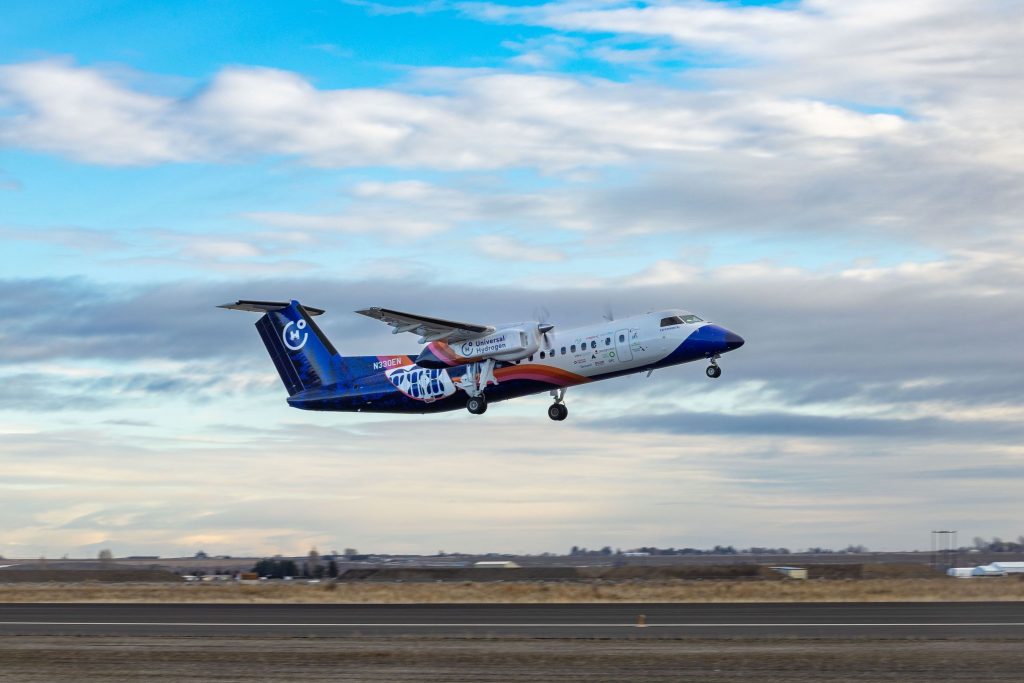Universal Hydrogen has flown a 40-passenger regional airliner using hydrogen fuel cell propulsion. The airplane, nicknamed Lightning McClean, took off at 8:41 am PST from Grant County International Airport (KMWH) and flew for 15 minutes, reaching an altitude of 3,500 MSL.
The flight, conducted under an FAA Special Airworthiness Certificate, was the first in a two-year flight test campaign expected to culminate in 2025 with entry into passenger service of ATR 72 regional aircraft converted to run on hydrogen.
In this first test flight, one of the airplane’s turbine engines was replaced with Universal Hydrogen’s fuel cell-electric, megawatt-class powertrain. The other remained a conventional engine for the safety of flight. The flight was piloted by Alex Kroll, an experienced former US Air Force test pilot and the company’s chief test pilot.
The startup plans to decarbonize aviation to help it to meet the Paris Agreement obligations. A few weeks earlier, ZeroAvia, a UK-based startup, had completed the first flight of a 19-seat Dornier 228 testbed aircraft that was converted to run partly on hydrogen fuel cells.
Thursday’s run, from a small airport near Moses Lake, is the first in a series of flight tests that Universal Hydrogen plans to conduct over the next two years. The company said it aims to enter a hydrogen-fueled aircraft into passenger service in 2025.
“By providing both an aircraft conversion solution for the existing fleet and a fuel service offering directly to regional airlines, we will be in passenger service with zero emissions by 2025 and in cargo service shortly after that,” said a post on the company website.
Its first customer will likely be Connect Airlines, a private jet operator that’s proposing to run a regional passenger service between Toronto, Chicago, and Philadelphia.
“We have committed to being North America’s first zero-emission airline, and this historic flight…is a key milestone on our journey,” John Thomas, CEO of Connect Airlines, said in a press release.
Aviation startups, major airlines, and manufacturers are all pursuing solutions to reduce the sector’s growing environmental impacts — short of encouraging people to fly less.
In the United States, commercial aircraft and business jets contribute roughly 3 percent of total greenhouse gas emissions every year, along with other harmful effects such as planet-warming contrails.
The replacement of the turboprop engine is done with a fuel-cell electric motor built around Plug Power’s ProGen family of fuel cells specially modified for aviation use. “One of the unique aspects of the design is that the powertrain does not use a battery—the fuel cells drive the electric motor directly—drastically reducing weight and cost,” said a press release.
The retrofit conversion kit eliminates the need to develop a brand-new airplane. “hydrogen fueling uses modular capsules compatible with existing freight networks and airport cargo handling equipment, making every airport in the world hydrogen-ready,” said Paul Eremenko, co-founder and CEO of Universal Hydrogen.
The company claims to have an order book that exceeds 247 aircraft conversions from 16 customers worldwide. The total value is estimated to be over $1 billion in modifications and about $2 billion for hydrogen fuel services for the first ten years.

